Piano Sheet Music
 "...Scotty Moore plays one of the first really amazing riffs in rock history on Heartbreak Hotel with Elvis Presley ... it was dangerous, it scared everybodys parents, which was part of the attraction then - as it still is now... it totally blindsided me and made me want to get a guitar and do that ..." Roger McGuinn / Byrds
"...Scotty Moore plays one of the first really amazing riffs in rock history on Heartbreak Hotel with Elvis Presley ... it was dangerous, it scared everybodys parents, which was part of the attraction then - as it still is now... it totally blindsided me and made me want to get a guitar and do that ..." Roger McGuinn / Byrds
Danny Elfman

Daniel Robert "Danny" Elfman (born May 29, 1953) is an American musician, best known for composing music for television and movies, and leading the rock band Oingo Boingo as singer/songwriter from 1976 until its breakup in 1995. He is a frequent collaborator with long-time friend Tim Burton, and has scored all but two of his films. He was nominated for four Academy Awards and won a Grammy Award for Tim Burton's Batman and an Emmy Award for his Desperate Housewives theme. Elfman also wrote the theme for the video game Fable. He is also famous for creating The Simpsons main title theme, and his role as Jack Skellington's singing voice in The Nightmare Before Christmas. He is the Uncle in-law to actress Jenna Elfman.
Eagles
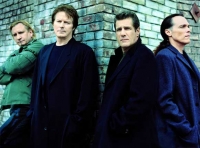
The Eagles are an American rock band that was formed in Los Angeles, California during the early 1970s. With five Number 1 singles and six Number 1 albums, the Eagles were one of the most successful recording artists of the decade. At the end of the 20th century, two of their albums, Eagles: Their Greatest Hits 1971–1975 and Hotel California, ranked among the ten best-selling albums according to the Recording Industry Association of America. The best-selling studio album Hotel California is rated as the thirty-seventh album in the Rolling Stone list "The 500 Greatest Albums of All Time", and the band was ranked number 75 on Rolling Stone's 2004 list of the 100 Greatest Artists of All Time. They are also the best-selling American group ever, with Eagles: Their Greatest Hits 1971–1975 being the best-selling album in the U.S. to date.
The Eagles broke up in 1980, but reunited in 1994 for Hell Freezes Over, a mix of live and new studio tracks. They have toured intermittently since then, and were inducted into the Rock and Roll Hall of Fame in 1998.
In 2007, the Eagles released Long Road out of Eden, their first full studio album in 28 years.
Members:
Glenn Frey
Don Henley
Joe Walsh
Timothy B. Schmit
The Eagles broke up in 1980, but reunited in 1994 for Hell Freezes Over, a mix of live and new studio tracks. They have toured intermittently since then, and were inducted into the Rock and Roll Hall of Fame in 1998.
In 2007, the Eagles released Long Road out of Eden, their first full studio album in 28 years.
Members:
Glenn Frey
Don Henley
Joe Walsh
Timothy B. Schmit
Samuel Barber

Samuel Osborne Barber II (March 9, 1910 – January 23, 1981) was an American composer of orchestral, opera, choral, and piano music. He is one of the most celebrated composers of the 20th century: music critic Donal Henahan stated that "Probably no other American composer has ever enjoyed such early, such persistent and such long-lasting acclaim."
His Adagio for Strings (1936) has earned a permanent place in the concert repertory of orchestras. He was awarded the Pulitzer Prize for Music twice: for his opera Vanessa (1956–57) and for the Concerto for Piano and Orchestra (1962). Also widely performed is his Knoxville: Summer of 1915 (1947), a setting for soprano and orchestra of a prose text by James Agee. At the time of his death, nearly all of his compositions had been recorded.
His Adagio for Strings (1936) has earned a permanent place in the concert repertory of orchestras. He was awarded the Pulitzer Prize for Music twice: for his opera Vanessa (1956–57) and for the Concerto for Piano and Orchestra (1962). Also widely performed is his Knoxville: Summer of 1915 (1947), a setting for soprano and orchestra of a prose text by James Agee. At the time of his death, nearly all of his compositions had been recorded.
Cannonball Adderley

Julian Edwin "Cannonball" Adderley was an American jazz alto saxophonist of the hard bop era of the 1950s and 1960s. Adderley is remembered for his 1966 soul jazz single "Mercy, Mercy, Mercy", a crossover hit on the pop charts
Phil Collins
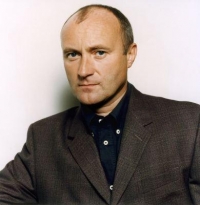
Philip David Charles Collins, LVO (born 30 January 1951 Chiswick, London) is an English singer-songwriter, drummer and actor best known as the lead singer and drummer of English progressive rock group Genesis and as a Grammy and Academy Award-winning solo artist. He has also appeared in several films.
Collins sang the lead vocals on eight American chart-toppers between 1984 and 1989; seven as a solo artist and one with Genesis. His singles, often dealing with lost love, ranged from the drum-heavy "In the Air Tonight", to the dance pop of "Sussudio", to the political statements of his most successful song, "Another Day In Paradise". His international popularity transformed Genesis from a progressive rock group to a regular on the pop charts and an early MTV mainstay. Collins' professional career began as a drummer, first with obscure rock group Flaming Youth and then more famously with Genesis. In Genesis, Collins originally supplied backing vocals for front man Peter Gabriel, singing lead on only two songs: "For Absent Friends" from 1971's Nursery Cryme album and "More Fool Me" from Selling England by the Pound, which was released in 1973. On Gabriel's departure in 1975, Collins became the group's lead singer. As the decade closed, Genesis's first international hit, "Follow You, Follow Me", demonstrated a drastic change from the band's early years. His concurrent solo career, heavily influenced by his personal life, brought both him and Genesis commercial success. According to Atlantic Records, Collins' total worldwide sales as a solo artist, as of 2002, were 150 million.
Collins sang the lead vocals on eight American chart-toppers between 1984 and 1989; seven as a solo artist and one with Genesis. His singles, often dealing with lost love, ranged from the drum-heavy "In the Air Tonight", to the dance pop of "Sussudio", to the political statements of his most successful song, "Another Day In Paradise". His international popularity transformed Genesis from a progressive rock group to a regular on the pop charts and an early MTV mainstay. Collins' professional career began as a drummer, first with obscure rock group Flaming Youth and then more famously with Genesis. In Genesis, Collins originally supplied backing vocals for front man Peter Gabriel, singing lead on only two songs: "For Absent Friends" from 1971's Nursery Cryme album and "More Fool Me" from Selling England by the Pound, which was released in 1973. On Gabriel's departure in 1975, Collins became the group's lead singer. As the decade closed, Genesis's first international hit, "Follow You, Follow Me", demonstrated a drastic change from the band's early years. His concurrent solo career, heavily influenced by his personal life, brought both him and Genesis commercial success. According to Atlantic Records, Collins' total worldwide sales as a solo artist, as of 2002, were 150 million.
Bruno Mars

Peter Gene Hernandez (born October 8, 1985), better known by his stage name Bruno Mars, is an American singer-songwriter and music producer. Raised in Honolulu, Hawaii by a family of musicians, Mars began making music at a young age. After performing in various musical venues in his hometown throughout his childhood, he decided to pursue a musical career. Mars began producing songs for other artists, joining production team The Smeezingtons.
He became recognized as a solo artist after lending his vocals and co-writing the hooks for the songs "Nothin' on You" by B.o.B, and "Billionaire" by Travie McCoy. He also co-wrote the hits "Right Round" by Flo Rida featuring Kesha, "Wavin' Flag" by K'naan, and "Fuck You!" by Cee Lo Green. In October 2010, he released his debut album, Doo-Wops & Hooligans. Anchored by the singles "Just the Way You Are" and "Grenade", the album peaked at number three on the Billboard 200. He has been nominated for seven Grammys at the 53rd Grammy Awards, which will be held on February 13, 2011.
He became recognized as a solo artist after lending his vocals and co-writing the hooks for the songs "Nothin' on You" by B.o.B, and "Billionaire" by Travie McCoy. He also co-wrote the hits "Right Round" by Flo Rida featuring Kesha, "Wavin' Flag" by K'naan, and "Fuck You!" by Cee Lo Green. In October 2010, he released his debut album, Doo-Wops & Hooligans. Anchored by the singles "Just the Way You Are" and "Grenade", the album peaked at number three on the Billboard 200. He has been nominated for seven Grammys at the 53rd Grammy Awards, which will be held on February 13, 2011.
Elton John

Sir Elton Hercules John CBE (born Reginald Kenneth Dwight on 25 March 1947) is an English pop/rock singer, composer and pianist.
In his four-decade career, John has been one of the dominant forces in rock and popular music, especially during the 1970s. He has sold over 200 million records, making him one of the most successful artists of all time. He has more than 50 Top 40 hits including seven consecutive No. 1 U.S. albums, 59 Top 40 singles, 16 Top 10, four No. 2 hits, and nine No. 1 hits. He has won five Grammy awards and one Academy Award. His success has had a profound impact on popular music and has contributed to the continued popularity of the piano in rock and roll. In 2004, Rolling Stone ranked him #49 on their list of the 100 greatest artists of all time.
Some of the characteristics of John's musical talent include an ability to quickly craft melodies for the lyrics of songwriting partner Bernie Taupin, his former rich tenor (now baritone) voice, his classical and gospel-influenced piano, the aggressive orchestral arrangements of Paul Buckmaster among others and the flamboyant fashions, outlandishly excessive eyeglasses, and on-stage showmanship, especially evident during the 1970s.
John was inducted into the Rock and Roll Hall of Fame in 1994. He has been heavily involved in the fight against AIDS since the late 1980s, and was knighted in 1998. He entered into a civil partnership with David Furnish on 21 December 2005 and continues to be a champion for LGBT social movements. On April 9, 2008, John held a benefit concert for Hillary Clinton's presidential campaign, raising $2.5 million.
In his four-decade career, John has been one of the dominant forces in rock and popular music, especially during the 1970s. He has sold over 200 million records, making him one of the most successful artists of all time. He has more than 50 Top 40 hits including seven consecutive No. 1 U.S. albums, 59 Top 40 singles, 16 Top 10, four No. 2 hits, and nine No. 1 hits. He has won five Grammy awards and one Academy Award. His success has had a profound impact on popular music and has contributed to the continued popularity of the piano in rock and roll. In 2004, Rolling Stone ranked him #49 on their list of the 100 greatest artists of all time.
Some of the characteristics of John's musical talent include an ability to quickly craft melodies for the lyrics of songwriting partner Bernie Taupin, his former rich tenor (now baritone) voice, his classical and gospel-influenced piano, the aggressive orchestral arrangements of Paul Buckmaster among others and the flamboyant fashions, outlandishly excessive eyeglasses, and on-stage showmanship, especially evident during the 1970s.
John was inducted into the Rock and Roll Hall of Fame in 1994. He has been heavily involved in the fight against AIDS since the late 1980s, and was knighted in 1998. He entered into a civil partnership with David Furnish on 21 December 2005 and continues to be a champion for LGBT social movements. On April 9, 2008, John held a benefit concert for Hillary Clinton's presidential campaign, raising $2.5 million.
Bach

Johann Sebastian Bach (31 March 1685 – 28 July 1750) was a German composer and organist whose sacred and secular works for choir, orchestra, and solo instruments drew together the strands of the Baroque period and brought it to its ultimate maturity. Although he introduced no new forms, he enriched the prevailing German style with a robust contrapuntal technique, an unrivalled control of harmonic and motivic organisation in composition for diverse musical forces, and the adaptation of rhythms and textures from abroad, particularly Italy and France.
Revered for their intellectual depth and technical and artistic beauty, Bach's works include the Brandenburg concertos; the Goldberg Variations; the English Suites, French Suites, Partitas, and Well-Tempered Clavier; the Mass in B Minor; the St. Matthew Passion; the St. John Passion; The Musical Offering; The Art of Fugue; the Sonatas and Partitas for violin solo; the Cello Suites; more than 200 surviving cantatas; and a similar number of organ works, including the celebrated Toccata and Fugue in D Minor.
While Bach's fame as an organist was great during his lifetime, he was not particularly well-known as a composer. His adherence to Baroque forms and contrapuntal style was considered "old-fashioned" by his contemporaries, especially late in his career when the musical fashion tended towards Rococo and later Classical styles. A revival of interest and performances of his music began early in the 19th century, and he is now widely considered to be one of the greatest composers in the Western tradition.
Revered for their intellectual depth and technical and artistic beauty, Bach's works include the Brandenburg concertos; the Goldberg Variations; the English Suites, French Suites, Partitas, and Well-Tempered Clavier; the Mass in B Minor; the St. Matthew Passion; the St. John Passion; The Musical Offering; The Art of Fugue; the Sonatas and Partitas for violin solo; the Cello Suites; more than 200 surviving cantatas; and a similar number of organ works, including the celebrated Toccata and Fugue in D Minor.
While Bach's fame as an organist was great during his lifetime, he was not particularly well-known as a composer. His adherence to Baroque forms and contrapuntal style was considered "old-fashioned" by his contemporaries, especially late in his career when the musical fashion tended towards Rococo and later Classical styles. A revival of interest and performances of his music began early in the 19th century, and he is now widely considered to be one of the greatest composers in the Western tradition.
Paolo Nutini

Paolo Giovanni Nutini (born 9 January 1987) is a Scottish singer/songwriter from Paisley. His father is of Italian descent, from Barga, Tuscany, and his mother is Scottish, although his father's family has been in Scotland for four generations.
Paolo Nutini was signed to Atlantic Records in May 2005, shortly after his 18th birthday. He released his first single "These Streets" as a free download in May 2006, this was then followed by his next single "Last Request" which was released on 4 July 2006 and charted at #5 in the official UK charts. In the video for "Last Request", Nutini plays the part of a robber - though this is not revealed until the end. Nutini's third single, "Jenny Don't Be Hasty", was released on 25 September 2006 and got to #20 on the UK Singles Chart. "Rewind" was Nutini's fourth single. It was released on 4 December 2006, and reached #27 in the UK.
His debut album These Streets, produced by Ken Nelson (Coldplay/Gomez), was released on 17 July 2006 and immediately entered the UK album charts at #3. Many of the songs on the album, including "Last Request" and "Rewind", were inspired by a turbulent relationship with his current girlfriend, Teri Brogan, and "Jenny Don't Be Hasty" is a true story about encounters with an older woman. These Streets, as Paolo himself puts it on his official website, he states, "The album is a little glimpse of some of the experiences I have been through in the last three years".
Paolo Nutini was signed to Atlantic Records in May 2005, shortly after his 18th birthday. He released his first single "These Streets" as a free download in May 2006, this was then followed by his next single "Last Request" which was released on 4 July 2006 and charted at #5 in the official UK charts. In the video for "Last Request", Nutini plays the part of a robber - though this is not revealed until the end. Nutini's third single, "Jenny Don't Be Hasty", was released on 25 September 2006 and got to #20 on the UK Singles Chart. "Rewind" was Nutini's fourth single. It was released on 4 December 2006, and reached #27 in the UK.
His debut album These Streets, produced by Ken Nelson (Coldplay/Gomez), was released on 17 July 2006 and immediately entered the UK album charts at #3. Many of the songs on the album, including "Last Request" and "Rewind", were inspired by a turbulent relationship with his current girlfriend, Teri Brogan, and "Jenny Don't Be Hasty" is a true story about encounters with an older woman. These Streets, as Paolo himself puts it on his official website, he states, "The album is a little glimpse of some of the experiences I have been through in the last three years".
Lady Gaga

Lady Gaga (born Stefani Joanne Angelina Germanotta on March 28, 1986) is an American recording artist. She began performing in the rock music scene of New York City's Lower East Side. She soon signed with Streamline Records, an imprint of Interscope Records, upon its establishment in 2007. During her early time at Interscope, she worked as a songwriter for fellow label artists and captured the attention of Akon, who recognized her vocal abilities, and had her also sign to his own label, Kon Live Distribution.
Her debut album, The Fame, was released on August 19, 2008. In addition to receiving generally positive reviews, it reached number-one in Canada, Austria, Germany, and Ireland and topped the Billboard Top Electronic Albums chart. Its first two singles, "Just Dance" and "Poker Face", co-written and co-produced with RedOne, became international number-one hits, topping the Hot 100 in the United States as well as other countries. The album later earned a total of six Grammy Award nominations and won awards for Best Electronic/Dance Album and Best Dance Recording. In early 2009, after having opened for New Kids on the Block and the Pussycat Dolls, she embarked on her first headlining tour, The Fame Ball Tour. By the fourth quarter of 2009, she released her second studio album The Fame Monster, with the global chart-topping lead single "Bad Romance", as well as having embarked on her second headlining tour of the year, The Monster Ball Tour.
Lady Gaga is inspired by glam rock musicians such as David Bowie and Freddie Mercury, as well as pop music artists such as Madonna and Michael Jackson. She has also stated fashion is a source of inspiration for her songwriting and performances. To date, she has sold over eight million albums and over thirty-five million singles worldwide.
Her debut album, The Fame, was released on August 19, 2008. In addition to receiving generally positive reviews, it reached number-one in Canada, Austria, Germany, and Ireland and topped the Billboard Top Electronic Albums chart. Its first two singles, "Just Dance" and "Poker Face", co-written and co-produced with RedOne, became international number-one hits, topping the Hot 100 in the United States as well as other countries. The album later earned a total of six Grammy Award nominations and won awards for Best Electronic/Dance Album and Best Dance Recording. In early 2009, after having opened for New Kids on the Block and the Pussycat Dolls, she embarked on her first headlining tour, The Fame Ball Tour. By the fourth quarter of 2009, she released her second studio album The Fame Monster, with the global chart-topping lead single "Bad Romance", as well as having embarked on her second headlining tour of the year, The Monster Ball Tour.
Lady Gaga is inspired by glam rock musicians such as David Bowie and Freddie Mercury, as well as pop music artists such as Madonna and Michael Jackson. She has also stated fashion is a source of inspiration for her songwriting and performances. To date, she has sold over eight million albums and over thirty-five million singles worldwide.
Ravel

Joseph-Maurice Ravel (March 7, 1875 – December 28, 1937) was a French composer of Impressionist music known especially for his melodies, orchestral and instrumental textures and effects. Much of his piano music, chamber music, vocal music and orchestral music has entered the standard concert repertoire.
Ravel's piano compositions, such as Jeux d'eau, Miroirs and Gaspard de la Nuit, demand considerable virtuosity from the performer, and his orchestral music, including Daphnis et Chloé and his arrangement of Modest Mussorgsky's Pictures at an Exhibition, uses a variety of sound and instrumentation very effectively.
Ravel is perhaps known best for his orchestral work, Boléro (1928), which he considered trivial and once described as "a piece for orchestra without music."
According to SACEM, Ravel's estate earns more royalties than that of any other French musician. According to international copyright law, Ravel's works are public domain since January 1, 2008 in most countries. In France, due to anomalous copyright law extensions to account for the two world wars, they will not enter the public domain until 2015.
Ravel's piano compositions, such as Jeux d'eau, Miroirs and Gaspard de la Nuit, demand considerable virtuosity from the performer, and his orchestral music, including Daphnis et Chloé and his arrangement of Modest Mussorgsky's Pictures at an Exhibition, uses a variety of sound and instrumentation very effectively.
Ravel is perhaps known best for his orchestral work, Boléro (1928), which he considered trivial and once described as "a piece for orchestra without music."
According to SACEM, Ravel's estate earns more royalties than that of any other French musician. According to international copyright law, Ravel's works are public domain since January 1, 2008 in most countries. In France, due to anomalous copyright law extensions to account for the two world wars, they will not enter the public domain until 2015.
Lorie Line

Lorie Line is a pianist and performer from Minneapolis, Minnesota. She has released over 20 albums and tours every year during the Christmas season.
She grew up in Reno, Nevada studying classical piano. At the age of 9, she entered and won annual Statewide competitions until the age of 18, where she enrolled at the University of Nevada, Reno. She received her B.A. in Music, Piano Performance.
Shortly after getting her degree, she and her husband, Tim, relocated to Minneapolis because of his job transfer. Using her piano performance degree, she auditioned for Dayton's and became a full-time pianist, serenading shoppers. It was here (1988-1993) that many fans first came to hear Lorie Line play the piano for the first time. the "shoppers" encouraged Lorie to record her own CD. She did, and became both pianist and vendor at the same time. Little did she know that she was onto something big.
Since then, Lorie Line has turned piano playing into one of the largest independent record companies in the world, Lorie Line Music, Inc. She has sold over 5 million albums, has published over 20 books of music, and has recorded 27 CDs. She, and members of her Pop Chamber Orchestra, performs to 100,000 people on over 85 stages a year. She tours spring, summer, fall and winter.
She grew up in Reno, Nevada studying classical piano. At the age of 9, she entered and won annual Statewide competitions until the age of 18, where she enrolled at the University of Nevada, Reno. She received her B.A. in Music, Piano Performance.
Shortly after getting her degree, she and her husband, Tim, relocated to Minneapolis because of his job transfer. Using her piano performance degree, she auditioned for Dayton's and became a full-time pianist, serenading shoppers. It was here (1988-1993) that many fans first came to hear Lorie Line play the piano for the first time. the "shoppers" encouraged Lorie to record her own CD. She did, and became both pianist and vendor at the same time. Little did she know that she was onto something big.
Since then, Lorie Line has turned piano playing into one of the largest independent record companies in the world, Lorie Line Music, Inc. She has sold over 5 million albums, has published over 20 books of music, and has recorded 27 CDs. She, and members of her Pop Chamber Orchestra, performs to 100,000 people on over 85 stages a year. She tours spring, summer, fall and winter.
Nat King Cole
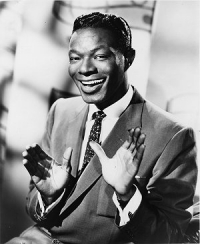
Nathaniel Adams Coles (March 17, 1919 â February 15, 1965), known professionally as Nat King Cole, was an American musician.
Cole first came to prominence as a leading jazz pianist, then switched his emphasis to singing, becoming one of the most popular and best known vocalists of all time.
Cole's first mainstream vocal hit was his 1943 recording of one of his compositions, "Straighten Up and Fly Right", based on a black folk tale that his father had used as a theme for a sermon. Johnny Mercer invited him to record it for the fledgling Capitol Records label. It sold over 500,000 copies, and proved that folk-based material could appeal to a wide audience. Although Nat would never be considered a rocker, the song can be seen as anticipating the first rock and roll records. Indeed, Bo Diddley, who performed similar transformations of folk material, counted Cole as an influence.
Beginning in the late 1940s, Cole began recording and performing more pop-oriented material for mainstream audiences, often accompanied by a string orchestra. His stature as a popular icon was cemented during this period by hits such as "The Christmas Song" (Cole recorded the tune four times: June 14, 1946 as a pure Trio recording; August 19, 1946 with an added string section; August 24, 1953; and again in 1961 for the double album, The Nat King Cole Story. This final version, recorded in stereo, is the one most often heard today.), "Nature Boy" (1948), "Mona Lisa" (1950), "Too Young" (the #1 song in 1951), and his signature tune "Unforgettable" (1951). While this shift to pop music led some jazz critics and fans to accuse Cole of selling out, he never totally abandoned his jazz roots; as late as 1956, for instance, he recorded an all-jazz album, After Midnight.
His last album, L-O-V-E, was recorded in early December 1964 â just a few days before entering the hospital for lung cancer treatment â and released just prior to his death; it peaked at #4 on the Billboard Albums chart in the spring of 1965. A Best Of album went gold in 1968. His 1957 recording of "When I Fall In Love" reached #4 in the UK charts in 1987.
Cole first came to prominence as a leading jazz pianist, then switched his emphasis to singing, becoming one of the most popular and best known vocalists of all time.
Cole's first mainstream vocal hit was his 1943 recording of one of his compositions, "Straighten Up and Fly Right", based on a black folk tale that his father had used as a theme for a sermon. Johnny Mercer invited him to record it for the fledgling Capitol Records label. It sold over 500,000 copies, and proved that folk-based material could appeal to a wide audience. Although Nat would never be considered a rocker, the song can be seen as anticipating the first rock and roll records. Indeed, Bo Diddley, who performed similar transformations of folk material, counted Cole as an influence.
Beginning in the late 1940s, Cole began recording and performing more pop-oriented material for mainstream audiences, often accompanied by a string orchestra. His stature as a popular icon was cemented during this period by hits such as "The Christmas Song" (Cole recorded the tune four times: June 14, 1946 as a pure Trio recording; August 19, 1946 with an added string section; August 24, 1953; and again in 1961 for the double album, The Nat King Cole Story. This final version, recorded in stereo, is the one most often heard today.), "Nature Boy" (1948), "Mona Lisa" (1950), "Too Young" (the #1 song in 1951), and his signature tune "Unforgettable" (1951). While this shift to pop music led some jazz critics and fans to accuse Cole of selling out, he never totally abandoned his jazz roots; as late as 1956, for instance, he recorded an all-jazz album, After Midnight.
His last album, L-O-V-E, was recorded in early December 1964 â just a few days before entering the hospital for lung cancer treatment â and released just prior to his death; it peaked at #4 on the Billboard Albums chart in the spring of 1965. A Best Of album went gold in 1968. His 1957 recording of "When I Fall In Love" reached #4 in the UK charts in 1987.
Marie Antoinette

Marie Antoinette is a 2006 biography film written and directed by Sofia Coppola about the life of Marie Antoinette, Queen of France. It won an Academy Award for Best Costume Design.
The film's anachronistic soundtrack contains songs by 1980s New Wave and post-punk bands such as New Order ("Ceremony"), The Cure ("All Cats Are Grey", "Plainsong"), Siouxsie and the Banshees ("Hong Kong Garden (With Strings Intro)"), Bow Wow Wow ("Fools Rush In", "Aphrodisiac" and "I Want Candy"), and Adam and the Ants ("Kings of the Wild Frontier"), as well as newer material by The Strokes, Aphex Twin, Dustin O'Halloran, and The Radio Dept.
The film's anachronistic soundtrack contains songs by 1980s New Wave and post-punk bands such as New Order ("Ceremony"), The Cure ("All Cats Are Grey", "Plainsong"), Siouxsie and the Banshees ("Hong Kong Garden (With Strings Intro)"), Bow Wow Wow ("Fools Rush In", "Aphrodisiac" and "I Want Candy"), and Adam and the Ants ("Kings of the Wild Frontier"), as well as newer material by The Strokes, Aphex Twin, Dustin O'Halloran, and The Radio Dept.
Green Day

Green Day is an American rock trio formed in 1987. The band has consisted of Billie Joe Armstrong (vocals, guitar), Mike Dirnt (bass guitar, vocals), and Tré Cool (drums, percussion) for the majority of its existence.
Green Day was originally part of the punk rock scene at 924 Gilman Street in Berkeley, California. Its early releases for independent record label Lookout! Records earned them a grassroots fanbase, some of whom felt alienated when the band signed to a major label.
The band has sold over 65 million records worldwide, They also have three Grammy Awards, Best Alternative Album for Dookie, Best Rock Album for American Idiot, and Record of the Year for "Boulevard of Broken Dreams".
Green Day was originally part of the punk rock scene at 924 Gilman Street in Berkeley, California. Its early releases for independent record label Lookout! Records earned them a grassroots fanbase, some of whom felt alienated when the band signed to a major label.
The band has sold over 65 million records worldwide, They also have three Grammy Awards, Best Alternative Album for Dookie, Best Rock Album for American Idiot, and Record of the Year for "Boulevard of Broken Dreams".
Jamie Cullum
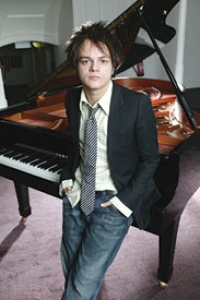
Jamie Cullum (born 20 August 1979) is an English pop and jazz-pop singer, songwriter, pianist, guitarist, and drummer.
Cullum was born at Romford Hospital in Essex, and educated at the independent fee-paying Grittleton House School and the sixth form at Sheldon School. Both are near Chippenham in Wiltshire. His mother, Yvonne, is a secretary of Anglo-Burmese origin, whose family settled in Wales after Burma's independence; his father, John Cullum, worked in finance. His paternal grandfather was a British Army officer, while his paternal grandmother was a Jewish refugee from Prussia who sang in Berlin nightclubs; Cullum has said that he sees her as his "cultural icon". He was brought up in Hullavington, Wiltshire but currently lives in North West London.
Cullum was born at Romford Hospital in Essex, and educated at the independent fee-paying Grittleton House School and the sixth form at Sheldon School. Both are near Chippenham in Wiltshire. His mother, Yvonne, is a secretary of Anglo-Burmese origin, whose family settled in Wales after Burma's independence; his father, John Cullum, worked in finance. His paternal grandfather was a British Army officer, while his paternal grandmother was a Jewish refugee from Prussia who sang in Berlin nightclubs; Cullum has said that he sees her as his "cultural icon". He was brought up in Hullavington, Wiltshire but currently lives in North West London.
Pasek and Paul
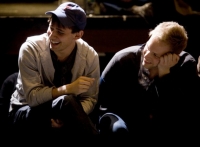
Pasek and Paul (Benj Pasek and Justin Paul) are a musical theatre writing team living in New York City.
Pasek and Paul began their collaboration as freshmen at the University of Michigan and completed their BFA degrees in musical theatre in December 2006.
They are the winners of a 2007 Jonathan Larson Award, which is named after the late Rent composer and honors achievement by composers, lyricists and librettists. Tina Landau and Stephen Schwartz were among the judges panel for the 2007 year. At age 21, Benj and Justin became the youngest recipients in the history of the foundation and were awarded a $20,000 cash prize, the highest amount ever given to a team.
Pasek and Paul are writers for John Tartaglia's Disney Channel television series "Johnny and the Sprites". The series premiere featured a song by Pasek and Paul titled "I Just Can't Get Enough".
They contributed music to Off-Broadway's upcoming "White Noise, ", which won Talkin' Broadway's 2006 Summer Theatre Festival Citation for Outstanding Original Score.
They have played sold-out shows at Joe's Pub at New York's Public Theatre and Ars Nova in New York City featuring a host of Broadway talents including Shoshana Bean, Billy Porter, Gavin Creel, Cheyenne Jackson, Steven Pasquale, Karen Mason, Celia Keenan-Bolger, and many more.
They were invited to participate in the first ever Johnny Mercer Songwriting Festival funded by the American Musical Theatre Project and are developing several original book musicals.
Pasek and Paul began their collaboration as freshmen at the University of Michigan and completed their BFA degrees in musical theatre in December 2006.
They are the winners of a 2007 Jonathan Larson Award, which is named after the late Rent composer and honors achievement by composers, lyricists and librettists. Tina Landau and Stephen Schwartz were among the judges panel for the 2007 year. At age 21, Benj and Justin became the youngest recipients in the history of the foundation and were awarded a $20,000 cash prize, the highest amount ever given to a team.
Pasek and Paul are writers for John Tartaglia's Disney Channel television series "Johnny and the Sprites". The series premiere featured a song by Pasek and Paul titled "I Just Can't Get Enough".
They contributed music to Off-Broadway's upcoming "White Noise, ", which won Talkin' Broadway's 2006 Summer Theatre Festival Citation for Outstanding Original Score.
They have played sold-out shows at Joe's Pub at New York's Public Theatre and Ars Nova in New York City featuring a host of Broadway talents including Shoshana Bean, Billy Porter, Gavin Creel, Cheyenne Jackson, Steven Pasquale, Karen Mason, Celia Keenan-Bolger, and many more.
They were invited to participate in the first ever Johnny Mercer Songwriting Festival funded by the American Musical Theatre Project and are developing several original book musicals.
Harry Connick Jr.
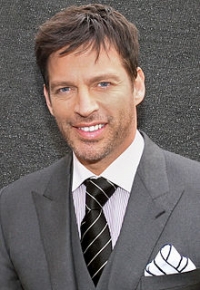
Joseph Harry Fowler Connick Jr. (born September 11, 1967) is an American singer, composer, actor, and television host. He has sold over 28 million albums worldwide. Connick is ranked among the top 60 best-selling male artists in the United States by the Recording Industry Association of America, with 16 million in certified sales. He has had seven top 20 US albums, and ten number-one US jazz albums, earning more number-one albums than any other artist in US jazz chart history.
Connick's best-selling album in the United States is his Christmas album When My Heart Finds Christmas (1993). His highest-charting album is his release Only You (2004), which reached No. 5 in the US and No. 6 in Britain. He has won three Grammy Awards and two Emmy Awards. He played Grace Adler’s husband, Leo Markus, on the NBC sitcom Will & Grace from 2002 to 2006.
Connick's best-selling album in the United States is his Christmas album When My Heart Finds Christmas (1993). His highest-charting album is his release Only You (2004), which reached No. 5 in the US and No. 6 in Britain. He has won three Grammy Awards and two Emmy Awards. He played Grace Adler’s husband, Leo Markus, on the NBC sitcom Will & Grace from 2002 to 2006.
Ryuichi Sakamoto
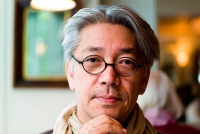
Ryuichi Sakamoto (坂本 龍一 Sakamoto Ryūichi?, born January 17, 1952) is an Academy Award-, Grammy-, and Golden Globe-winning Japanese musician, composer, record producer and actor, based in New York and Tokyo. He played keyboards in the influential Japanese electropop band Yellow Magic Orchestra. His 1999 musical composition "Energy Flow" is the first number-one instrumental single in the Japan's Oricon charts history. He was ranked at number 59 in a list of the top 100 most influential musicians compiled by HMV Japan.
Franz Liszt

Franz Liszt (Hungarian: Ferencz Liszt, in modern usage Ferenc Liszt, from 1859 to 1865 officially Franz Ritter von Liszt) (October 22, 1811 – July 31, 1886) was a Hungarian composer, virtuoso pianist and teacher. He was also the father-in-law of Richard Wagner. In 1865 he became abbot in the Roman Catholic Church.
Liszt became renowned throughout Europe during the 19th century for his great skill as a performer. He was said by his contemporaries to have been the most technically advanced pianist of his age and perhaps the greatest pianist of all time. He was also an important and influential composer, a notable piano teacher, a conductor who contributed significantly to the modern development of the art, and a benefactor to other composers and performers, notably Richard Wagner, Hector Berlioz, Camille Saint-Saëns, Edvard Grieg and Alexander Borodin.
As a composer, Liszt was one of the most prominent representatives of the "Neudeutsche Schule" ("New German School"). He left behind a huge and diverse body of work, in which he influenced his forward-looking contemporaries and anticipated some 20th-century ideas and trends. Some of his most notable contributions were the invention of the symphonic poem, developing the concept of thematic transformation as part of his experiments in musical form and making radical departures in harmony.
Liszt became renowned throughout Europe during the 19th century for his great skill as a performer. He was said by his contemporaries to have been the most technically advanced pianist of his age and perhaps the greatest pianist of all time. He was also an important and influential composer, a notable piano teacher, a conductor who contributed significantly to the modern development of the art, and a benefactor to other composers and performers, notably Richard Wagner, Hector Berlioz, Camille Saint-Saëns, Edvard Grieg and Alexander Borodin.
As a composer, Liszt was one of the most prominent representatives of the "Neudeutsche Schule" ("New German School"). He left behind a huge and diverse body of work, in which he influenced his forward-looking contemporaries and anticipated some 20th-century ideas and trends. Some of his most notable contributions were the invention of the symphonic poem, developing the concept of thematic transformation as part of his experiments in musical form and making radical departures in harmony.
Vivaldi

Antonio Lucio Vivaldi (March 4, 1678 â July 28, 1741), nicknamed il Prete Rosso ("The Red Priest"), was a Venetian priest and Baroque music composer, as well as a famous virtuoso violinist; he was born and raised in the Republic of Venice. The Four Seasons, a series of four violin concerti, is his best-known work and a highly popular Baroque piece.
Many of Vivaldi's compositions reflect a flamboyant, almost playful, exuberance. Most of Vivaldi's repertoire was rediscovered only in the first half of the 20th century in Turin and Genoa and was published in the second half. Vivaldi's music is innovative, breaking a consolidated tradition in schemes; he gave brightness to the formal and the rhythmic structure of the concerto, repeatedly looking for harmonic contrasts and innovative melodies and themes. Moreover, Vivaldi was able to compose nonacademic music, particularly meant to be appreciated by the wide public and not only by an intellectual minority. The joyful appearance of his music reveals in this regard a transmissible joy of composing; these are among the causes of the vast popularity of his music. This popularity soon made him famous in other countries such as France which was, at the time, very independent concerning its musical taste.
Vivaldi is considered one of the composers who brought Baroque music (with its typical contrast among heavy sonorities) to evolve into a classical style. Johann Sebastian Bach was deeply influenced by Vivaldi's concertos and arias (recalled in his Johannes Passion, Matthäuspassion, and cantatas). Bach transcribed a number of Vivaldi's concerti for solo keyboard, along with a number for orchestra, including the famous Concerto for Four Violins and Violoncello, Strings and Continuo (RV 580).
Many of Vivaldi's compositions reflect a flamboyant, almost playful, exuberance. Most of Vivaldi's repertoire was rediscovered only in the first half of the 20th century in Turin and Genoa and was published in the second half. Vivaldi's music is innovative, breaking a consolidated tradition in schemes; he gave brightness to the formal and the rhythmic structure of the concerto, repeatedly looking for harmonic contrasts and innovative melodies and themes. Moreover, Vivaldi was able to compose nonacademic music, particularly meant to be appreciated by the wide public and not only by an intellectual minority. The joyful appearance of his music reveals in this regard a transmissible joy of composing; these are among the causes of the vast popularity of his music. This popularity soon made him famous in other countries such as France which was, at the time, very independent concerning its musical taste.
Vivaldi is considered one of the composers who brought Baroque music (with its typical contrast among heavy sonorities) to evolve into a classical style. Johann Sebastian Bach was deeply influenced by Vivaldi's concertos and arias (recalled in his Johannes Passion, Matthäuspassion, and cantatas). Bach transcribed a number of Vivaldi's concerti for solo keyboard, along with a number for orchestra, including the famous Concerto for Four Violins and Violoncello, Strings and Continuo (RV 580).
The Color Purple
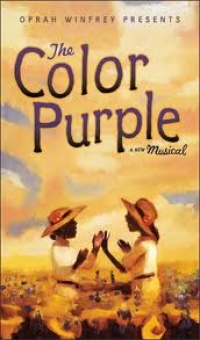
The Color Purple is a Broadway musical based upon the novel The Color Purple by Alice Walker. It features music and lyrics written by Brenda Russell, Allee Willis and Stephen Bray, with a book by Marsha Norman. It ran on Broadway in 2005 and has been touring throughout the US. The Broadway production earned eleven 2006 Tony Awards nominations.
Rachmaninoff

Sergei Vasilievich Rachmaninoff (1 April 1873 - 28 March 1943) was a Russian composer, pianist, and conductor. He was one of the finest pianists of his day and, as a composer, the last great representative of Russian late Romanticism in classical music. Early influences of Tchaikovsky, Rimsky-Korsakov and other Russian composers gave way to a thoroughly personal idiom which included a pronounced lyricism, expressive breadth, structural ingenuity and a tonal palette of rich, distinctive orchestral colors.
Understandably, the piano figures prominently in Rachmaninoff's compositional output, either as a solo instrument or as part of an ensemble. He made it a point, however, to use his own skills as a performer to explore fully the expressive possibilities of the instrument. Even in his earliest works, he revealed a sure grasp of idiomatic piano writing and a striking gift for melody. In some of his early orchestral pieces he showed the first signs of a talent for tone painting, which he would perfect in The Isle of the Dead, and he began to show a similar penchant for vocal writing in two early sets of songs, Opp. 4 and 8. Rachmaninoff's masterpiece, however, is his choral symphony The Bells, in which all of his talents are fused and unified.
Rachmaninoff sometimes felt threatened by the success of modernists such as Scriabin and Prokofiev and wondered whether to cease composing even before he left Russia. His musical philosophy was rooted in the Russian spiritual tradition, where the role of the artist was to create beauty and to speak the truth from the depths of his heart. In his last major interview, in 1941, he admitted his music, like Russian music, was a product of his temperament. He said, on another occasion, "The new kind of music seems to create not from the heart but from the head. Its composers think rather than feel. They have not the capacity to make their works exalt—they meditate, protest, analyze, reason, calculate and brood, but they do not exalt."
Understandably, the piano figures prominently in Rachmaninoff's compositional output, either as a solo instrument or as part of an ensemble. He made it a point, however, to use his own skills as a performer to explore fully the expressive possibilities of the instrument. Even in his earliest works, he revealed a sure grasp of idiomatic piano writing and a striking gift for melody. In some of his early orchestral pieces he showed the first signs of a talent for tone painting, which he would perfect in The Isle of the Dead, and he began to show a similar penchant for vocal writing in two early sets of songs, Opp. 4 and 8. Rachmaninoff's masterpiece, however, is his choral symphony The Bells, in which all of his talents are fused and unified.
Rachmaninoff sometimes felt threatened by the success of modernists such as Scriabin and Prokofiev and wondered whether to cease composing even before he left Russia. His musical philosophy was rooted in the Russian spiritual tradition, where the role of the artist was to create beauty and to speak the truth from the depths of his heart. In his last major interview, in 1941, he admitted his music, like Russian music, was a product of his temperament. He said, on another occasion, "The new kind of music seems to create not from the heart but from the head. Its composers think rather than feel. They have not the capacity to make their works exalt—they meditate, protest, analyze, reason, calculate and brood, but they do not exalt."
Oscar Peterson
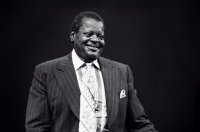
Oscar Emmanuel Peterson, CC, CQ, O.Ont. (August 15, 1925 – December 23, 2007) was a Canadian jazz pianist and composer. He was called the "Maharaja of the keyboard" by Duke Ellington, "O.P." by his friends, and was a member of jazz royalty. He released over 200 recordings, won seven Grammy Awards, and received other numerous awards and honours over the course of his career. He is considered to have been one of the greatest jazz pianists of all time, who played thousands of live concerts to audiences worldwide in a career lasting more than 65 years.
Richard Strauss
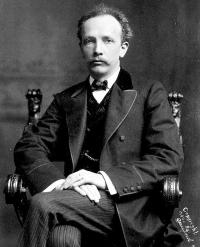
Richard Georg Strauss (German pronunciation: ; 11 June 1864 – 8 September 1949) was a German composer, conductor, pianist, and violinist. Considered a leading composer of the late Romantic and early modern eras, he has been described as a successor of Richard Wagner and Franz Liszt. Along with Gustav Mahler, he represents the late flowering of German Romanticism after Wagner, in which pioneering subtleties of orchestration are combined with an advanced harmonic style.
W.A. Mozart

Wolfgang Amadeus Mozart (German: , full baptismal name Johannes Chrysostomus Wolfgangus Theophilus Mozart (27 January 1756 – 5 December 1791), was a prolific and influential composer of the Classical era. He composed over 600 works, many acknowledged as pinnacles of symphonic, concertante, chamber, piano, operatic, and choral music. He is among the most enduringly popular of classical composers.
Mozart showed prodigious ability from his earliest childhood in Salzburg. Already competent on keyboard and violin, he composed from the age of five and performed before European royalty; at 17 he was engaged as a court musician in Salzburg, but grew restless and traveled in search of a better position, always composing abundantly. While visiting Vienna in 1781, he was dismissed from his Salzburg position. He chose to stay in the capital, where he achieved fame but little financial security. During his final years in Vienna, he composed many of his best-known symphonies, concertos, and operas, and the Requiem. The circumstances of his early death have been much mythologized. He was survived by his wife Constanze and two sons.
Mozart learned voraciously from others, and developed a brilliance and maturity of style that encompassed the light and graceful along with the dark and passionate—the whole informed by a vision of humanity "redeemed through art, forgiven, and reconciled with nature and the absolute." His influence on subsequent Western art music is profound. Beethoven wrote his own early compositions in the shadow of Mozart, of whom Joseph Haydn wrote that "posterity will not see such a talent again in 100 years."
Mozart showed prodigious ability from his earliest childhood in Salzburg. Already competent on keyboard and violin, he composed from the age of five and performed before European royalty; at 17 he was engaged as a court musician in Salzburg, but grew restless and traveled in search of a better position, always composing abundantly. While visiting Vienna in 1781, he was dismissed from his Salzburg position. He chose to stay in the capital, where he achieved fame but little financial security. During his final years in Vienna, he composed many of his best-known symphonies, concertos, and operas, and the Requiem. The circumstances of his early death have been much mythologized. He was survived by his wife Constanze and two sons.
Mozart learned voraciously from others, and developed a brilliance and maturity of style that encompassed the light and graceful along with the dark and passionate—the whole informed by a vision of humanity "redeemed through art, forgiven, and reconciled with nature and the absolute." His influence on subsequent Western art music is profound. Beethoven wrote his own early compositions in the shadow of Mozart, of whom Joseph Haydn wrote that "posterity will not see such a talent again in 100 years."
Michael Nyman
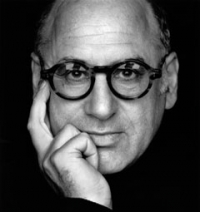
Michael Laurence Edward Nyman, CBE (born 23 March 1944, Stratford, London) is an English composer of minimalist music, pianist, librettist and musicologist, perhaps best known for the many movie scores he wrote during his lengthy collaboration with the filmmaker Peter Greenaway, and his multi-platinum soundtrack album to Jane Campion's The Piano. His operas include The Man Who Mistook His Wife for a Hat, Letters, Riddles and Writs, Noises, Sounds & Sweet Airs, Facing Goya, Man and Boy: Dada, Love Counts, and Sparkie: Cage and Beyond, and he has written six concerti, four string quartets, and many other chamber works, many for his Michael Nyman Band, with and without whom he tours as a performing pianist. Nyman has stated his preference for writing opera to other sorts of music. In 2008 Man On Wire was released, much of the film's soundtrack is derived from the 2006 album, The Composer's Cut Series Vol. II: Nyman/Greenaway Revisited.
Nina Simone
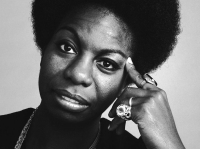
Nina Simone was an American singer, songwriter, pianist, arranger, and civil rights activist who worked in a broad range of musical styles including classical, jazz, blues, folk, R&B, gospel, and pop.
Michael Buble

Michael Steven Bublé (born 9 September 1975) is a Canadian big band singer. He won several awards, including a Grammy and multiple Juno Awards. While achieving modest chart success in the United States, his 2003 self-titled album has reached the top ten in Lebanon, the UK and his home country. However, he did find commercial success in the U.S. with his 2005 album It's Time. He has sold over 18 million albums. Michael has also appeared on the TV series Rove four times.
The album Michael Bublé was released by Warner Bros. Records just before Valentine's Day in 2003. The album was actually first released by the Warner company in South Africa, where the album went into the Top 5 and was certified Gold. Soon after that, it entered the Canadian album charts. As success in the USA was marginal at best, Bublé started visiting countries all over the world, with the album being successful in places like the Philippines and Singapore. He then moved on to placed like Italy and eventually had chart success in the UK, U.S., Australia and elsewhere soon followed with the album going Platinum and reaching the top ten of the album charts in the UK and Canada and going all the way to #1 in Australia. The album has reached the top 50 of the Billboard 200 album charts in the U.S. His version of George Michael's "Kissing a Fool" was released as a single from the album and reached the top 30 of the Billboard Hot Adult Contemporary Tracks chart. "How Can You Mend a Broken Heart?" reached the top 30 of the Billboard Adult Contemporary chart as well. His third single "Sway" also reached the top 30 of the Adult Contemporary chart, while a Junkie XL remix of the song reached the top 20 in Australia in May 2004.
Bublé's second studio album, It's Time, debuted as a hugely successful performance. The album reached number 7 on the Billboard 200 album chart and number 2 on the ARIA Album Charts in Australia. It's Time also debuted at number 4 on the UK Album Charts. The album features covers of Beatles and Ray Charles songs, and the hit single "Home".
The album Michael Bublé was released by Warner Bros. Records just before Valentine's Day in 2003. The album was actually first released by the Warner company in South Africa, where the album went into the Top 5 and was certified Gold. Soon after that, it entered the Canadian album charts. As success in the USA was marginal at best, Bublé started visiting countries all over the world, with the album being successful in places like the Philippines and Singapore. He then moved on to placed like Italy and eventually had chart success in the UK, U.S., Australia and elsewhere soon followed with the album going Platinum and reaching the top ten of the album charts in the UK and Canada and going all the way to #1 in Australia. The album has reached the top 50 of the Billboard 200 album charts in the U.S. His version of George Michael's "Kissing a Fool" was released as a single from the album and reached the top 30 of the Billboard Hot Adult Contemporary Tracks chart. "How Can You Mend a Broken Heart?" reached the top 30 of the Billboard Adult Contemporary chart as well. His third single "Sway" also reached the top 30 of the Adult Contemporary chart, while a Junkie XL remix of the song reached the top 20 in Australia in May 2004.
Bublé's second studio album, It's Time, debuted as a hugely successful performance. The album reached number 7 on the Billboard 200 album chart and number 2 on the ARIA Album Charts in Australia. It's Time also debuted at number 4 on the UK Album Charts. The album features covers of Beatles and Ray Charles songs, and the hit single "Home".
Thelonious Monk

Thelonious Sphere Monk was an American jazz pianist and composer. He had a unique improvisational style and made numerous contributions to the standard jazz repertoire, including "'Round Midnight", "Blue Monk", "Straight, No Chaser", "Ruby, My Dear", "In Walked Bud", and "Well, You Needn't"
Children of Eden

Children of Eden is a two-act musical play with music and lyrics by Stephen Schwartz based on a book by John Caird. The musical is loosely based on the Book of Genesis. Act I tells the story of Adam and Eve, Cain, and Abel, and Act II deals with Noah and the Flood. While using the Bible as a plot source, it freely deviates in many details, and is a story of parents and children without a specifically religious point-of-view. Though it had a very short run on London's West End and has never played Broadway, the show is extremely popular in community theatres worldwide. The show uses the same principals in both acts, with the actors each taking on a different character for the story of Noah.
Love Story

Love Story is a 1970 romantic drama film written by Erich Segal coordinated with his 1970 best-selling novel. It was directed by Arthur Hiller. The film, well-known as a tear-jerking tragedy, is considered one of the most romantic of all time by the American Film Institute (#9 on the list), and was followed by a sequel, Oliver's Story in 1978. Love Story starred Ali MacGraw and Ryan O'Neal and also marked the film debut of a then-unknown Tommy Lee Jones, who played a minor role in the film.
Joseph Kosma

Joseph Kosma was a Hungarian-French composer. Date of birth: October 22, 1905, Budapest, Hungary Date and place of death: August 7, 1969, France
John Williams

John Towner Williams (born February 8, 1932) is an American composer, conductor, and pianist. In a career that spans six decades, Williams has composed many of the most famous film scores in Hollywood history, including Star Wars, Superman, Home Alone, the first three Harry Potter movies and all but two of Steven Spielberg's feature films including the Indiana Jones series, Schindler's List, E.T. the Extra-Terrestrial, Jurassic Park and Jaws. He also composed the soundtrack for the hit 1960s television series Lost in Space as well as the fanfare of the DreamWorks Pictures' logo.
Williams has composed theme music for four Olympic Games, the NBC Nightly News, the rededication of the Statue of Liberty, and numerous television series and concert pieces. He served as the principal conductor of the Boston Pops Orchestra from 1980 to 1993, and is now the orchestra's laureate conductor.
Williams is a five-time winner of the Academy Award. He has also won four Golden Globe Awards, seven BAFTA Awards and 21 Grammy Awards. With 45 Academy Award nominations, Williams is, together with composer Alfred Newman, the second most nominated person after Walt Disney. He was inducted into the Hollywood Bowl Hall of Fame in 2000, and was a recipient of the Kennedy Center Honors in 2004.
Williams has composed theme music for four Olympic Games, the NBC Nightly News, the rededication of the Statue of Liberty, and numerous television series and concert pieces. He served as the principal conductor of the Boston Pops Orchestra from 1980 to 1993, and is now the orchestra's laureate conductor.
Williams is a five-time winner of the Academy Award. He has also won four Golden Globe Awards, seven BAFTA Awards and 21 Grammy Awards. With 45 Academy Award nominations, Williams is, together with composer Alfred Newman, the second most nominated person after Walt Disney. He was inducted into the Hollywood Bowl Hall of Fame in 2000, and was a recipient of the Kennedy Center Honors in 2004.
ZUN

ZUN" and is the main programmer, scriptwriter, graphic artist, and music composer. His real name is Jun'ya Ōta
Robbie Williams
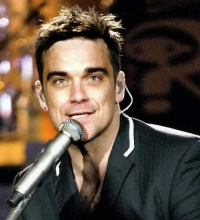
Robert Peter Maximilian Williams (born 13 February 1974) is a Grammy Award-nominated, 15-time BRIT Award-winning English singer-songwriter. His career started as a member of the pop band Take That in 1990. He left Take That in 1995 to begin his solo career, after selling 25 million records with the group.
His album sales stand at over 55 million, with singles sales over 17 million.
Williams entered the The Guinness Book of World Records when in just one day he sold more than 1.6 million tickets for his 2006 world tour. He has been the recipient of many awards, including fifteen BRIT and six ECHO awards. In 2004, he was inducted into the UK Music Hall of Fame, after being voted as the Greatest artist of the 1990s.
Robbie Williams is the artist who is currently featured the most times in the UK Now That's What I Call Music! series. In the first 68 Now!s he has appeared 29 times (including 4 times with Take That). His first appearance was with Take That on Now 22 and his most recent appearance was on Now 66 with "She's Madonna".
His album sales stand at over 55 million, with singles sales over 17 million.
Williams entered the The Guinness Book of World Records when in just one day he sold more than 1.6 million tickets for his 2006 world tour. He has been the recipient of many awards, including fifteen BRIT and six ECHO awards. In 2004, he was inducted into the UK Music Hall of Fame, after being voted as the Greatest artist of the 1990s.
Robbie Williams is the artist who is currently featured the most times in the UK Now That's What I Call Music! series. In the first 68 Now!s he has appeared 29 times (including 4 times with Take That). His first appearance was with Take That on Now 22 and his most recent appearance was on Now 66 with "She's Madonna".
Disney

The Walt Disney Company (NYSE: DIS), often simply known as Disney, is the largest media and entertainment conglomerate in the world, known for its family-friendly products. Founded on October 16, 1923, by brothers Walt Disney and Roy Disney as an animation studio, it has become one of the biggest Hollywood studios, and owner and licensor of eleven theme parks and several television networks, including ABC and ESPN. Disney's corporate headquarters and primary production facilities are located at The Walt Disney Studios in Burbank, California. The company has been a component of the Dow Jones Industrial Average since May 6, 1991. Mickey Mouse serves as the official mascot of The Walt Disney Company.
Keith Jarrett

Keith Jarrett (born May 8, 1945 in Allentown, Pennsylvania) is an American pianist and composer.
His career started with Art Blakey, Charles Lloyd and Miles Davis. Since the early 1970s he has enjoyed a great deal of success in both classical music and jazz, as a group leader and a solo performer. His improvisation technique combines not only jazz, but also other forms of music, especially classical, gospel, blues and ethnic folk music.
In 2003 he received the Polar Music Prize, being the first (and to this day only) recipient not sharing the prize with anyone else.
His career started with Art Blakey, Charles Lloyd and Miles Davis. Since the early 1970s he has enjoyed a great deal of success in both classical music and jazz, as a group leader and a solo performer. His improvisation technique combines not only jazz, but also other forms of music, especially classical, gospel, blues and ethnic folk music.
In 2003 he received the Polar Music Prize, being the first (and to this day only) recipient not sharing the prize with anyone else.
The Doors
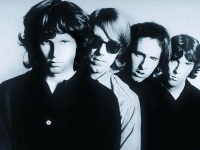
The Doors were an American rock band formed in 1965 in Los Angeles by vocalist Jim Morrison, keyboardist Ray Manzarek, drummer John Densmore, and guitarist Robby Krieger. They were considered a controversial band, due mostly to Morrison's cryptic lyrics and unpredictable stage persona. The band dissolved in March 1973, short of two years after Morrison's death in July 1971. According to the RIAA, they have sold over 32 million albums in the US alone.
The Doors' music during the 1965-68 era was a fusion of hard rock, blues-rock, and acid rock. The origins of The Doors lay in a chance meeting between acquaintances and fellow UCLA film school alumni Jim Morrison and Ray Manzarek on Venice Beach California in July 1965. Morrison told Manzarek he had been writing songs (Morrison said "I was taking notes at a fantasic rock-n-roll concert going on in my head") and, at Manzarek's encouragement, sang "Moonlight Drive". Impressed by Morrison's lyrics, Manzarek suggested they form a band.
The Doors' music during the 1965-68 era was a fusion of hard rock, blues-rock, and acid rock. The origins of The Doors lay in a chance meeting between acquaintances and fellow UCLA film school alumni Jim Morrison and Ray Manzarek on Venice Beach California in July 1965. Morrison told Manzarek he had been writing songs (Morrison said "I was taking notes at a fantasic rock-n-roll concert going on in my head") and, at Manzarek's encouragement, sang "Moonlight Drive". Impressed by Morrison's lyrics, Manzarek suggested they form a band.
Mussorgsky
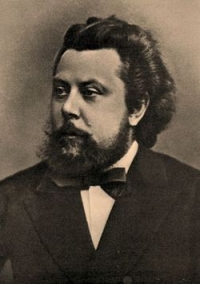
Modest Petrovich Mussorgsky (March 21, 1839 – March 28, 1881), one of the Russian composers known as the Five, was an innovator of Russian music. He strove to achieve a uniquely Russian musical identity, often in deliberate defiance of the established conventions of Western music.
Like his literary contemporary Fyodor Dostoyevsky, Mussorgsky depicts in his music "the insulted and the injured" with all their passion and pain. He raises these characters to tragic heights until the grotesque and majestic coexist. Mussorgsky could accomplish this not simply out of compassion or guilt towards them, but because in his works he almost becomes them. Mussorgsky's music is vivid, confused, feverish and ultimately hypnotizing —again, like Dostoyevsky at his best.
Many of his major works were inspired by Russian history, Russian folklore, and other nationalist themes, including the opera Boris Godunov, the orchestral tone poem Night on Bald Mountain, and the piano suite Pictures at an Exhibition. However, while Mussorgsky's music can be vivid and nationalistic, it does not glorify the powerful and is at times (such as in The Field-Marshal) antimilitaristic. For this reason, it was perceived as being directed against the state and its composer "under suspicion." He, like the others in The Russian Five, were considered dangerous extremists by the emperor and his court. This may have been the reason Tsar Alexander III personally crossed off Boris Godounov from the list of proposed pieces for the imperial opera in 1888.
For many years Mussorgsky's works were mainly known in versions revised or completed by other composers. Many of his most important compositions have recently come into their own in their original forms, and some of the original scores are now also available.
Like his literary contemporary Fyodor Dostoyevsky, Mussorgsky depicts in his music "the insulted and the injured" with all their passion and pain. He raises these characters to tragic heights until the grotesque and majestic coexist. Mussorgsky could accomplish this not simply out of compassion or guilt towards them, but because in his works he almost becomes them. Mussorgsky's music is vivid, confused, feverish and ultimately hypnotizing —again, like Dostoyevsky at his best.
Many of his major works were inspired by Russian history, Russian folklore, and other nationalist themes, including the opera Boris Godunov, the orchestral tone poem Night on Bald Mountain, and the piano suite Pictures at an Exhibition. However, while Mussorgsky's music can be vivid and nationalistic, it does not glorify the powerful and is at times (such as in The Field-Marshal) antimilitaristic. For this reason, it was perceived as being directed against the state and its composer "under suspicion." He, like the others in The Russian Five, were considered dangerous extremists by the emperor and his court. This may have been the reason Tsar Alexander III personally crossed off Boris Godounov from the list of proposed pieces for the imperial opera in 1888.
For many years Mussorgsky's works were mainly known in versions revised or completed by other composers. Many of his most important compositions have recently come into their own in their original forms, and some of the original scores are now also available.
Richard Wagner

Wilhelm Richard Wagner (pronounced /ˈvɑːɡnər/, German pronunciation: ; 22 May 1813 – 13 February 1883) was a German composer, conductor, theatre director and essayist, primarily known for his operas (or "music dramas", as they were later called). Wagner's compositions, particularly those of his later period, are notable for their complex texture, rich harmonies and orchestration, and the elaborate use of leitmotifs: musical themes associated with individual characters, places, ideas or plot elements. Unlike most other opera composers, Wagner wrote both the music and libretto for every one of his stage works. Famous extracts from his operas include the "Ride of the Valkyries" and the Bridal Chorus from Lohengrin, popularly known as the wedding march "Here Comes the Bride".
Initially establishing his reputation as a composer of works such as The Flying Dutchman and Tannhäuser which were in the romantic traditions of Weber and Meyerbeer, Wagner transformed operatic thought through his concept of the Gesamtkunstwerk ("total work of art"). This would achieve the synthesis of all the poetic, visual, musical and dramatic arts, and was announced in a series of essays between 1849 and 1852. Wagner realised this concept most fully in the first half of the monumental four-opera cycle Der Ring des Nibelungen. However, his thoughts on the relative importance of music and drama were to change again and he reintroduced some traditional operatic forms into his last few stage works including Die Meistersinger von Nürnberg.
Wagner pioneered advances in musical language, such as extreme chromaticism and quickly shifting tonal centres, which greatly influenced the development of European classical music. His Tristan und Isolde is sometimes described as marking the start of modern music. Wagner's influence spread beyond music into philosophy, literature, the visual arts and theatre. He had his own opera house built, the Bayreuth Festspielhaus, which contained many novel design features. It was here that the Ring and Parsifal received their premieres and where his most important stage works continue to be performed today in an annual festival run by his descendants. Wagner's views on conducting were also highly influential. His extensive writings on music, drama and politics have all attracted extensive comment; not least for their frequently antisemitic content.
Wagner achieved all of this despite a life characterised, until his last decades, by political exile, turbulent love affairs, poverty and repeated flight from his creditors. His pugnacious personality and often outspoken views on music, politics and society made him a controversial figure during his life. He has remained one to this day. The impact of his his ideas can be traced in many of the arts throughout the twentieth century.
Initially establishing his reputation as a composer of works such as The Flying Dutchman and Tannhäuser which were in the romantic traditions of Weber and Meyerbeer, Wagner transformed operatic thought through his concept of the Gesamtkunstwerk ("total work of art"). This would achieve the synthesis of all the poetic, visual, musical and dramatic arts, and was announced in a series of essays between 1849 and 1852. Wagner realised this concept most fully in the first half of the monumental four-opera cycle Der Ring des Nibelungen. However, his thoughts on the relative importance of music and drama were to change again and he reintroduced some traditional operatic forms into his last few stage works including Die Meistersinger von Nürnberg.
Wagner pioneered advances in musical language, such as extreme chromaticism and quickly shifting tonal centres, which greatly influenced the development of European classical music. His Tristan und Isolde is sometimes described as marking the start of modern music. Wagner's influence spread beyond music into philosophy, literature, the visual arts and theatre. He had his own opera house built, the Bayreuth Festspielhaus, which contained many novel design features. It was here that the Ring and Parsifal received their premieres and where his most important stage works continue to be performed today in an annual festival run by his descendants. Wagner's views on conducting were also highly influential. His extensive writings on music, drama and politics have all attracted extensive comment; not least for their frequently antisemitic content.
Wagner achieved all of this despite a life characterised, until his last decades, by political exile, turbulent love affairs, poverty and repeated flight from his creditors. His pugnacious personality and often outspoken views on music, politics and society made him a controversial figure during his life. He has remained one to this day. The impact of his his ideas can be traced in many of the arts throughout the twentieth century.
Barry Manilow
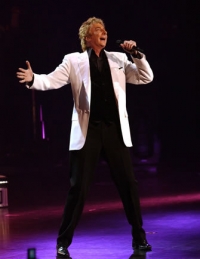
Barry Manilow (born June 17, 1943) is an American singer-songwriter, musician, arranger, producer and conductor, best known for such recordings as I Write the Songs, Mandy, Weekend in New England and Copacabana.
Manilow's achievements include sales of more than 76 million records worldwide. In 1978, five of his albums were on the best-selling charts simultaneously; a feat equalled only by Frank Sinatra and Johnny Mathis. He has recorded a string of Billboard hit singles and multi-platinum albums that have resulted in his being named Radio & Records number one Adult Contemporary artist and winning three straight American Music Awards for Favorite Pop/Rock Male Artist. Several well-known entertainers have given Manilow their "stamp of approval," including Sinatra, who was quoted in the 1970s regarding Manilow, "He's next." In 1988, Bob Dylan stopped Manilow at a party, hugged him and said, "Don't stop what you're doing, man. We're all inspired by you." Arsenio Hall cited Manilow as a favorite guest on The Arsenio Hall Show and admonished his audience to respect him for his work.
As well as producing and arranging albums for other artists, such as Bette Midler, Dionne Warwick and Rosemary Clooney, Manilow has written songs for musicals, films, and commercials.
Since February 2005, he has been the headliner at the Las Vegas Hilton, and has performed hundreds of shows since.
Manilow's achievements include sales of more than 76 million records worldwide. In 1978, five of his albums were on the best-selling charts simultaneously; a feat equalled only by Frank Sinatra and Johnny Mathis. He has recorded a string of Billboard hit singles and multi-platinum albums that have resulted in his being named Radio & Records number one Adult Contemporary artist and winning three straight American Music Awards for Favorite Pop/Rock Male Artist. Several well-known entertainers have given Manilow their "stamp of approval," including Sinatra, who was quoted in the 1970s regarding Manilow, "He's next." In 1988, Bob Dylan stopped Manilow at a party, hugged him and said, "Don't stop what you're doing, man. We're all inspired by you." Arsenio Hall cited Manilow as a favorite guest on The Arsenio Hall Show and admonished his audience to respect him for his work.
As well as producing and arranging albums for other artists, such as Bette Midler, Dionne Warwick and Rosemary Clooney, Manilow has written songs for musicals, films, and commercials.
Since February 2005, he has been the headliner at the Las Vegas Hilton, and has performed hundreds of shows since.
Koji Kondo

Koji Kondo (近藤浩治 Kondō Kōji?, born August 13, 1960) is a Japanese video game composer and sound director who has been employed at Nintendo since 1984. He is best known for scoring numerous titles in the Mario and The Legend of Zelda series.
Queen

Queen were an English rock band formed in 1970 in London by guitarist Brian May, lead vocalist Freddie Mercury, and drummer Roger Taylor, with bass guitarist John Deacon completing the lineup the following year. While it is uncertain how many albums the band has sold, estimations range from 130 million to over 300 million albums worldwide.
The band is noted for their musical diversity, multi-layered arrangements, vocal harmonies, and incorporation of audience participation into their live performances. Their 1985 Live Aid performance was voted the best live rock performance of all time in an industry poll.
Queen had moderate success in the early 1970s, with the albums Queen and Queen II, but it was with the release of Sheer Heart Attack in 1974 and A Night at the Opera the following year that the band gained international success. They have released fifteen studio albums, five live albums, and numerous compilation albums. Eighteen of these have reached number one on charts around the world.
Following Mercury's death in 1991 and Deacon's retirement later in the decade, May and Taylor have performed infrequently under the Queen name. Since 2005 they have been collaborating with Paul Rodgers, under the moniker Queen + Paul Rodgers.
The band is noted for their musical diversity, multi-layered arrangements, vocal harmonies, and incorporation of audience participation into their live performances. Their 1985 Live Aid performance was voted the best live rock performance of all time in an industry poll.
Queen had moderate success in the early 1970s, with the albums Queen and Queen II, but it was with the release of Sheer Heart Attack in 1974 and A Night at the Opera the following year that the band gained international success. They have released fifteen studio albums, five live albums, and numerous compilation albums. Eighteen of these have reached number one on charts around the world.
Following Mercury's death in 1991 and Deacon's retirement later in the decade, May and Taylor have performed infrequently under the Queen name. Since 2005 they have been collaborating with Paul Rodgers, under the moniker Queen + Paul Rodgers.
Antonin Dvorak

Antonín Leopold Dvořák (English pronunciation: /ˈdvɒrʒɑːk/ DVOR-zhahk or /ˈdvɒrʒæk/ DVOR-zhak; Czech: ( listen); September 8, 1841 – May 1, 1904) was a Czech composer of Romantic music, who employed the idioms of the folk music of Moravia and his native Bohemia. His works include operas, symphonic, choral and chamber music. His best-known works include his New World Symphony, the Slavonic Dances, "American" String Quartet, and Cello Concerto in B minor.
Dvořák wrote in a variety of forms: his nine symphonies generally stick to classical models that Beethoven would have recognised, but he also worked in the newly developed symphonic poem form and the influence of Richard Wagner is apparent in some works. Many of his works also show the influence of Czech folk music, both in terms of rhythms and melodic shapes; perhaps the best known examples are the two sets of Slavonic Dances. Dvořák also wrote operas (of which the best known is Rusalka); serenades for string orchestra and wind ensemble; chamber music (including a number of string quartets, and quintets); songs; choral music; and piano music.
Dvořák wrote in a variety of forms: his nine symphonies generally stick to classical models that Beethoven would have recognised, but he also worked in the newly developed symphonic poem form and the influence of Richard Wagner is apparent in some works. Many of his works also show the influence of Czech folk music, both in terms of rhythms and melodic shapes; perhaps the best known examples are the two sets of Slavonic Dances. Dvořák also wrote operas (of which the best known is Rusalka); serenades for string orchestra and wind ensemble; chamber music (including a number of string quartets, and quintets); songs; choral music; and piano music.
Max Reger
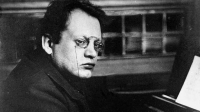
Max Reger Composer Description Johann Baptist Joseph Maximilian Reger is a German composer, pianist, organist, conductor and teacher. Date of birth: March 19, 1873, Brand, Germany Date and place of death: May 11, 1916, Leipzig, Germany
Erik Satie

Éric Alfred Leslie Satie, who signed his name Erik Satie after 1884, was a French composer and pianist. Satie was an influential artist in the late 19th- and early 20th-century Parisian avant-garde.
Claude Bolling
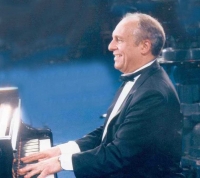
Claude Bolling (born 10 April 1930), is a renowned French jazz pianist, composer, arranger, and occasional actor.
He was born in Cannes, studied at the Nice Conservatory, then in Paris. A child prodigy, by age 14 he was playing jazz piano professionally, with Lionel Hampton, Roy Eldridge, and Kenny Clarke. Bolling's books on jazz technique show that he did not delve far beyond bebop into much avant garde jazz. He was a major part of the traditional jazz revival in the late 1960s, and he became friends with Oscar Peterson.
He has written music for over one hundred films, mostly French, starting with the score for a 1957 documentary about the Cannes Film Festival, and including the films Borsalino (1970), and California Suite (1978).
Bolling is also noted for a series of "crossover" collaborations with classical musicians. His Suite for Flute and Jazz Piano Trio with Jean-Pierre Rampal, a mix of Baroque elegance with modern swing, has been a top seller for many years, and was followed up by other works in the same vein. It was particularly popular in the United States, at the top of the hit parade for two years after its release and on billboard top 40 for 530 weeks, roughly ten years.
Following his work with Rampal, Bolling went on to work with many other musicians, from different genres, including Alexandre Lagoya, Pinchas Zukerman, Maurice André, and Yo-Yo Ma. He has also worked with, and performed tributes to many others, including Lionel Hampton, Duke Ellington, Stéphane Grappelli, Django Reinhardt, Oscar Peterson.
He was born in Cannes, studied at the Nice Conservatory, then in Paris. A child prodigy, by age 14 he was playing jazz piano professionally, with Lionel Hampton, Roy Eldridge, and Kenny Clarke. Bolling's books on jazz technique show that he did not delve far beyond bebop into much avant garde jazz. He was a major part of the traditional jazz revival in the late 1960s, and he became friends with Oscar Peterson.
He has written music for over one hundred films, mostly French, starting with the score for a 1957 documentary about the Cannes Film Festival, and including the films Borsalino (1970), and California Suite (1978).
Bolling is also noted for a series of "crossover" collaborations with classical musicians. His Suite for Flute and Jazz Piano Trio with Jean-Pierre Rampal, a mix of Baroque elegance with modern swing, has been a top seller for many years, and was followed up by other works in the same vein. It was particularly popular in the United States, at the top of the hit parade for two years after its release and on billboard top 40 for 530 weeks, roughly ten years.
Following his work with Rampal, Bolling went on to work with many other musicians, from different genres, including Alexandre Lagoya, Pinchas Zukerman, Maurice André, and Yo-Yo Ma. He has also worked with, and performed tributes to many others, including Lionel Hampton, Duke Ellington, Stéphane Grappelli, Django Reinhardt, Oscar Peterson.
Carlo Gesualdo

Carlo Gesualdo, known as Gesualdo da Venosa (March 8, 1566 – September 8, 1613), Prince of Venosa and Count of Conza, was an Italian music composer, lutenist and nobleman of the late Renaissance. He is famous for his intensely expressive madrigals, which use a chromatic language not heard again until the 19th century; and also for committing what are amongst the most notorious murders in musical history.
Schubert

Franz Peter Schubert (January 31, 1797 – November 19, 1828) was an Austrian composer. He wrote some 600 lieder, nine symphonies (including the famous "Unfinished Symphony"), liturgical music, operas, and a large body of chamber and solo piano music. He is particularly noted for his original melodic and harmonic writing.
While Schubert had a close circle of friends and associates who admired his work (including his teacher Antonio Salieri, and the prominent singer Johann Michael Vogl), wider appreciation of his music during his lifetime was limited at best. He was never able to secure adequate permanent employment, and for most of his career he relied on the support of friends and family. Interest in Schubert's work increased dramatically in the decades following his death and he is now widely considered to be one of the greatest composers in the Western tradition.
While he was clearly influenced by the Classical sonata forms of Beethoven and Mozart (his early works, among them notably the 5th Symphony, are particularly Mozartean), his formal structures and his developments tend to give the impression more of melodic development than of harmonic drama. This combination of Classical form and long-breathed Romantic melody sometimes lends them a discursive style: his 9th Symphony was described by Robert Schumann as running to "heavenly lengths". His harmonic innovations include movements in which the first section ends in the key of the subdominant rather than the dominant (as in the last movement of the Trout Quintet). Schubert's practice here was a forerunner of the common Romantic technique of relaxing, rather than raising, tension in the middle of a movement, with final resolution postponed to the very end.
While Schubert had a close circle of friends and associates who admired his work (including his teacher Antonio Salieri, and the prominent singer Johann Michael Vogl), wider appreciation of his music during his lifetime was limited at best. He was never able to secure adequate permanent employment, and for most of his career he relied on the support of friends and family. Interest in Schubert's work increased dramatically in the decades following his death and he is now widely considered to be one of the greatest composers in the Western tradition.
While he was clearly influenced by the Classical sonata forms of Beethoven and Mozart (his early works, among them notably the 5th Symphony, are particularly Mozartean), his formal structures and his developments tend to give the impression more of melodic development than of harmonic drama. This combination of Classical form and long-breathed Romantic melody sometimes lends them a discursive style: his 9th Symphony was described by Robert Schumann as running to "heavenly lengths". His harmonic innovations include movements in which the first section ends in the key of the subdominant rather than the dominant (as in the last movement of the Trout Quintet). Schubert's practice here was a forerunner of the common Romantic technique of relaxing, rather than raising, tension in the middle of a movement, with final resolution postponed to the very end.
Rossini

Gioachino Antonio Rossini (February 29, 1792 – November 13, 1868) was a popular Italian composer who created 39 operas as well as sacred music and chamber music. His best known works include Il barbiere di Siviglia (The Barber of Seville), La Cenerentola and Guillaume Tell (William Tell).
Rossini's most famous opera was produced on February 20, 1816 at the Teatro Argentina in Rome. The libretto by Cesare Sterbini, a version of Pierre Beaumarchais' infamous stage play Le Barbier de Séville, was the same as that already used by Giovanni Paisiello in his own Barbiere, an opera which had enjoyed European popularity for more than a quarter of a century. Much is made of how fast Rossini's opera was written, scholarship generally agreeing upon two weeks. Later in life, Rossini claimed to have written the opera in only twelve days. It was a colossal failure when it premiered as Almaviva; Paisiello’s admirers were extremely indignant, sabotaging the production by whistling and shouting during the entire first act. However, not long after the second performance, the opera became so successful that the fame of Paisiello's opera was transferred to Rossini's, to which the title The Barber of Seville passed as an inalienable heritage.
Rossini's most famous opera was produced on February 20, 1816 at the Teatro Argentina in Rome. The libretto by Cesare Sterbini, a version of Pierre Beaumarchais' infamous stage play Le Barbier de Séville, was the same as that already used by Giovanni Paisiello in his own Barbiere, an opera which had enjoyed European popularity for more than a quarter of a century. Much is made of how fast Rossini's opera was written, scholarship generally agreeing upon two weeks. Later in life, Rossini claimed to have written the opera in only twelve days. It was a colossal failure when it premiered as Almaviva; Paisiello’s admirers were extremely indignant, sabotaging the production by whistling and shouting during the entire first act. However, not long after the second performance, the opera became so successful that the fame of Paisiello's opera was transferred to Rossini's, to which the title The Barber of Seville passed as an inalienable heritage.
Bela Bartok

Béla Viktor János Bartók (pronounced /ˈbɑrtɒk/ (Wells 1990), Hungarian pronunciation: ) (March 25, 1881 – September 26, 1945) was a Hungarian composer and pianist. He is considered to be one of the greatest composers of the 20th century and is regarded, along with Liszt, as his country's greatest composer (Gillies 2001). Through his collection and analytical study of folk music, he was one of the founders of ethnomusicology.
The Lion King
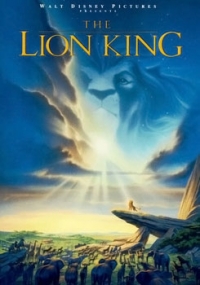
The Lion King is a 1994 American animated feature film produced by Walt Disney Feature Animation, released in theaters on June 15, 1994 by Walt Disney Pictures. It is the 32nd film in the Disney animated feature canon. The film was the highest grossing animated film of all time until the release of Finding Nemo (a Disney/Pixar computer-animated film). The Lion King still holds the record as the highest grossing traditionally animated film in history. This film also belongs to an era known as the Disney Renaissance.
The story, which was strongly influenced by the Shakespearean play Hamlet and Disney's 1942 classic Bambi, takes place in a kingdom of anthropomorphic animals in Africa. A musical film, The Lion King garnered two Academy Awards for its achievement in music. Songs were written by composer Elton John and lyricist Tim Rice, with an original score by Hans Zimmer. Disney later produced two related movies: a sequel, The Lion King II: Simba's Pride; and a part prequel-part parallel, The Lion King 1½.
The Lion King: Original Motion Picture Soundtrack is the original motion picture soundtrack for Walt Disney's The Lion King. The songs were written by Elton John and Tim Rice. The original score was composed and arranged by Hans Zimmer. The soundtrack was recorded in three different countries, namely: USA, UK and South Africa.
The story, which was strongly influenced by the Shakespearean play Hamlet and Disney's 1942 classic Bambi, takes place in a kingdom of anthropomorphic animals in Africa. A musical film, The Lion King garnered two Academy Awards for its achievement in music. Songs were written by composer Elton John and lyricist Tim Rice, with an original score by Hans Zimmer. Disney later produced two related movies: a sequel, The Lion King II: Simba's Pride; and a part prequel-part parallel, The Lion King 1½.
The Lion King: Original Motion Picture Soundtrack is the original motion picture soundtrack for Walt Disney's The Lion King. The songs were written by Elton John and Tim Rice. The original score was composed and arranged by Hans Zimmer. The soundtrack was recorded in three different countries, namely: USA, UK and South Africa.
 Sheet Music 365 is a site for those who wants to access popular sheet music easily,
letting them download the sheet music for free for trial purposes.
It's completely free to download and try the listed sheet music, but you have to delete the files after 24 hours of trial.
Don't forget, if you like the piece of music you have just learned playing,
treat the artist with respect, and go buy the original sheet music.
Sheet Music 365 is a site for those who wants to access popular sheet music easily,
letting them download the sheet music for free for trial purposes.
It's completely free to download and try the listed sheet music, but you have to delete the files after 24 hours of trial.
Don't forget, if you like the piece of music you have just learned playing,
treat the artist with respect, and go buy the original sheet music.